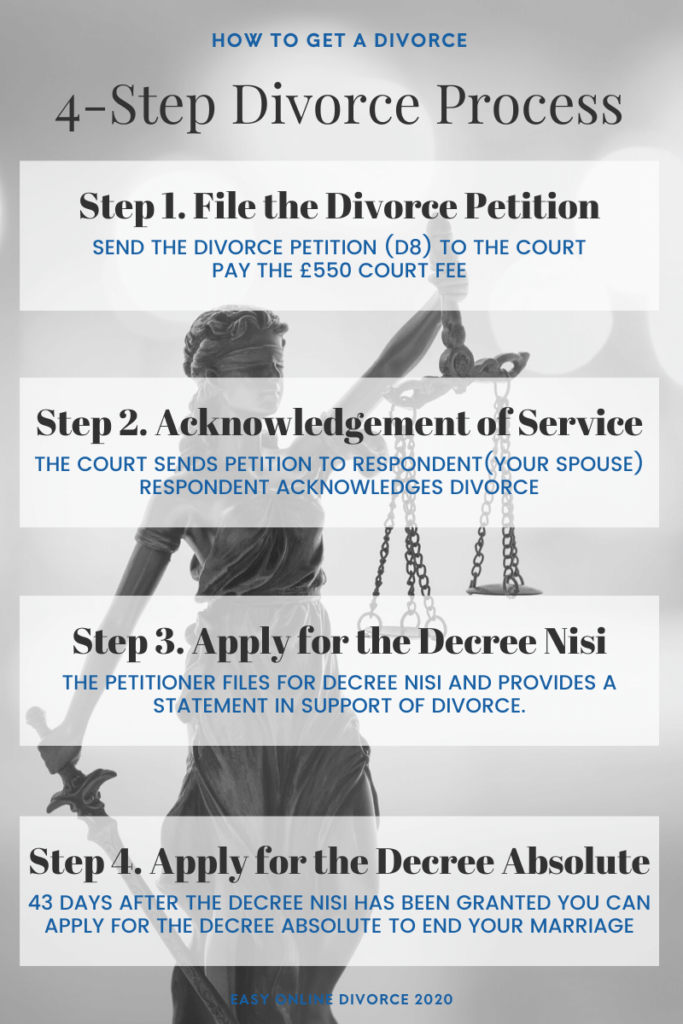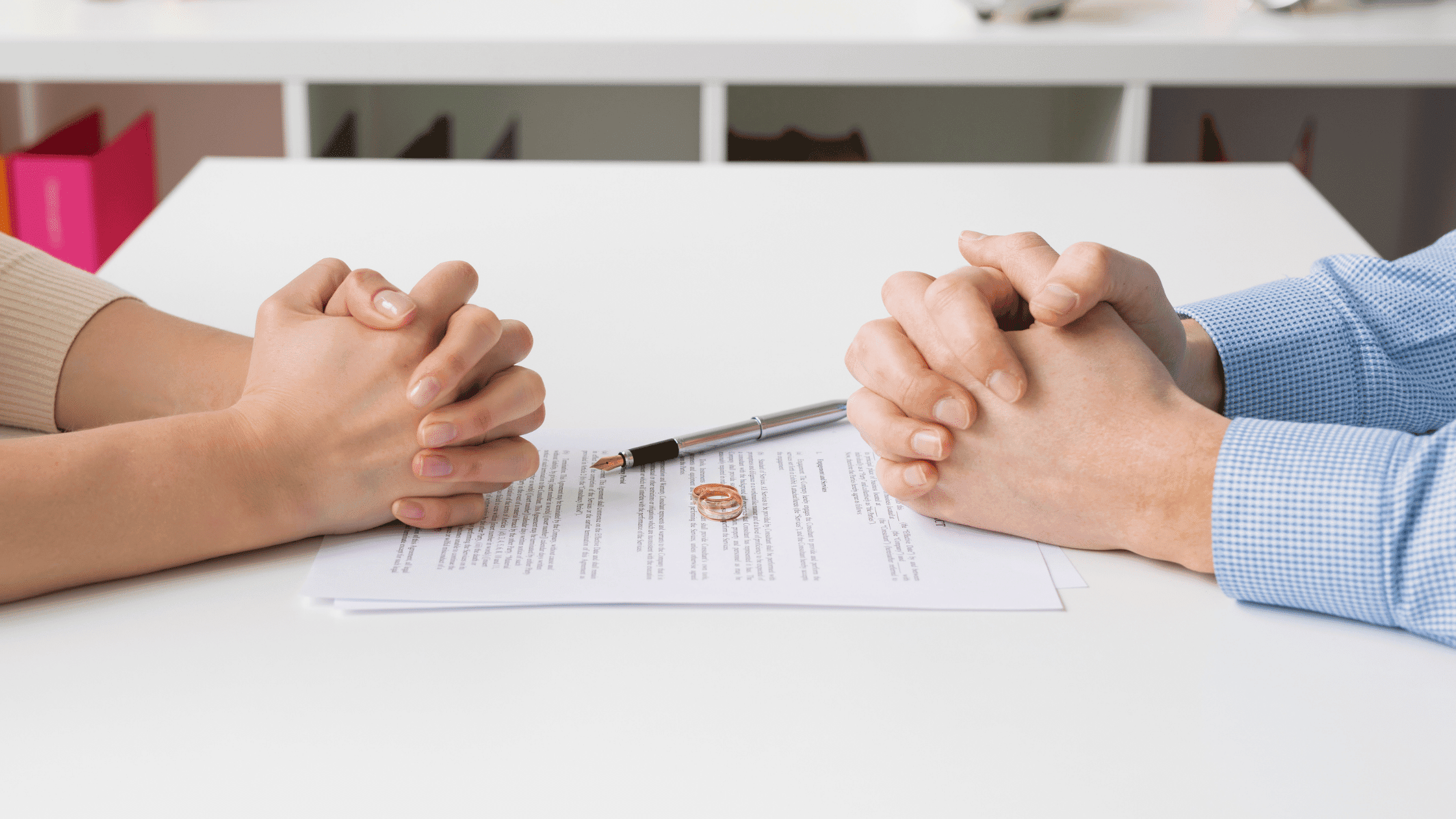How to get a divorce in England & Wales – The Divorce Process
To get a divorce in England and Wales, you need to show that your marriage has broken down, and you must follow the divorce process to obtain what is known as a decree absolute, to end your marriage legally.
When most people consider divorce, they immediately start thinking about getting a solicitor. In some situations, that might be the right thing to do, but in 99% of cases, divorces are eventually uncontested.
This means that both parties agree to the divorce. It may have taken some time to get there, and it may have been challenging at times, but most couples eventually reach an agreement. And when couples agree to a divorce, the process becomes more of a paper exercise, and you don’t need to hire expensive solicitors for that.
It’s quicker too. If you are both in agreement, your divorce can be finalised in about 4 months, without even having to attend court.
What follows is a guide to the divorce process. We have broken it down into four steps to give a quick and simplified overview of how to get a divorce.
Before you begin
To get a divorce in England and Wales:
- You must have been married for over a year
- Your relationship has permanently broken down
- Your marriage is legally recognised in the UK
- The UK is your permanent home or the permanent home of your husband or wife
In the eyes of the law, it doesn’t matter who files for divorce. However, the petitioner, the person who files, must pay the £593 court fee. As it is possible to reduce this cost if the petitioner receives certain benefits or is under a certain income threshold, it might be more beneficial for your spouse to be the petitioner if you both agree to the divorce.
The steps that follow assume you are filing the divorce. If your spouse files, the process is the same, except that you become the respondent.
The Four-Step Divorce Process

Step 1. File the Divorce Petition
The divorce process starts by filing a divorce petition (form D8). A petition is a request to do something. In this case, divorce. If you start the divorce, you are called the petitioner, and your spouse becomes the respondent.
The D8 form is the main document in the divorce procedure, and it must be completed correctly to avoid delays and potential amendment fees.
Step 2. Acknowledgement of Service
Once the court has received your petition, they will send a copy to your spouse with an acknowledgement of service form, which your spouse needs to complete and return within seven days.
Using this form, the respondent acknowledges receipt of the petition and indicates whether they agree with what has been written. If the respondent agrees to the divorce, the petitioner can apply for the first stage of the two-part divorce order—the decree nisi.
Step 3. Apply for the Decree Nisi
A decree nisi is a document that says the court doesn’t see any reason why you can’t divorce. Accompanying the application for a decree nisi, the petitioner must file a statement in support of the divorce petition.
If the judge agrees, the court will send you and your spouse a certificate with the time and date you will be granted a decree nisi.
You are still married after the decree nisi has been granted. You must wait 43 days before you can apply for a ‘decree absolute’ to end the marriage.
Step 4. Apply for the Decree Absolute
The decree absolute is the legal document that ends your marriage, and you can apply for it 43 days after the decree nisi has been granted. Applying for the decree absolute typically takes two weeks, and it will formally and legally end your marriage.
Would you like us to deal with your divorce from start-to-finish? We can handle everything for you so that you can carry on with your life without the stress and worry, and you will save at least £750 on the cost of your divorce compared to a high street solicitor.
What are the grounds for starting divorce proceedings?
The only legal grounds for divorce is that the marriage has irretrievably broken down. This means that you are unable or not willing to remain married to your spouse. Your relationship cannot be retrieved and has come to a definite end.
People often think that it’s enough to say that they have ‘grown apart’ to end their marriage. However, unless you have lived apart from your spouse for more than two years, you must place blame on your husband/wife to obtain a divorce.
Grounds for divorce – The five facts
The person who starts proceedings is called the petitioner. If the petitioner can convince the court that their marriage has irretrievably broken down, the court will allow the divorce. To do this, the petitioner must use one of the following five facts or grounds for divorce:
- Unreasonable behaviour
- Adultery
- Desertion
- Two years’ separation with consent
- Five years’ separation (no consent required)
Choosing the right grounds for divorce
To make the divorce process as straightforward as possible, it is vital to establish the grounds on which to base your divorce petition as early as possible. In many cases, the marriage breakdown reasons do not fit neatly into one of the five categories, and often there is overlap.
However, regardless of the reasons for divorce you choose, the most important thing is to agree on these reasons with your spouse beforehand. This reduces the chance of your spouse contesting the divorce and dragging expensive solicitors into your dispute.
What are the court fees in divorce?
The court sets the court fees. They must be paid at the very beginning of the divorce process when submitting the divorce petition. The cost is currently £593, and this pays for the court staff who process your divorce.
What many people don’t realise is that they may not have to pay the fee, or they may get some money off if they are on a low-income or receive certain benefits such as:
- Income-based Jobseeker’s Allowance (JSA)
- Income-related Employment and Support Allowance (ESA)
- Income Support
- Universal Credit (and you earn less than £6,000 a year)
- Pension Credit (Guarantee Credit)
We are the only company that helps its customers through this process so they get the reduction in court fees that they are entitled to. We work with the Courts and Tribunals service so that you can get your answer in minutes so that we can process your divorce without you having to wait weeks for a decision.
If you would like to find out more to see if you might be entitled to a reduction in court fees, see our article here.
Beware of ‘Online Divorce For Just £37 – No Court Fees.’
You have no doubt seen companies advertising ‘No Court’ fees. These advertisements are illegal because they mislead people. We often get enquiries where people think that the divorce fees advertised replace the court fees. But this is not the case. Like taxes, the government gets paid no matter what. If you are not eligible for help with fees you will have to pay the £593 court fees, there is no way to avoid it.
How long does an online divorce take?
Each divorce is different, as every couple has unique circumstances. For an accurate estimate, you can email us or call us on 020 4530 8101.
Research from the Ministry of Justice shows that the average time from divorce petition to decree absolute is a shocking 53 weeks.
In comparison, Easy Online Divorce takes around four months on average.
High-street solicitors tend to take around nine months, which suggests that DIY applications significantly slow down the average, probably because life gets in the way of the many stages that must be followed to finalise the divorce.
Beware of ‘Quickie Divorce’ websites.
We often have phone calls from people looking for a 12-week divorce. There is no such thing as a guaranteed 12-week divorce, but they have seen it advertised by unscrupulous divorce providers who use it as clickbait.
The best way to find out how fast a divorce could be is to ask the company how they will file your divorce. If they say a paper filing by post, you will know it will take much longer. With the current challenges of the postal service and court staff working from home, paper-based divorces will take six months and longer.
Only a company, such as Easy Online Divorce who are approved to use HM Court and Tribunals computer systems, can file divorces electronically and directly into the Justice Departments systems, to achieve the fastest divorce times. We don’t have to rely on the postal system for the signing of documents. But even with these advantages, we never over-promise our customers. We estimate an average of four months to manage expectations and avoid disappointment.
How Easy Online Divorce can help you with the divorce process
Easy Online Divorce is the perfect solution for people looking to save time, stress and money when seeking a divorce.
Unlike high-street solicitors, we use the latest technology to provide the most convenient, fast and cost-effective divorce in the UK. When you use our service you don’t need to:
- Waste time visiting offices to provide paperwork.
- Get frustrated from being passed around secretaries and receptionists.
- Spend over £180 per hour on legal fees with no control over costs
- Wait over eight months to finalise your divorce
Using Easy Online Divorce to end your marriage is the best option when you and your spouse are in agreement because the divorce process is mostly a paperwork exercise, and you don’t need to pay expensive solicitors to do that.
We can handle everything for you so that you can carry on with your life without the stress, worry or excessive legal fees.
Fully Managed Divorce
Our fully managed divorce costs only £249 and is backed by a success guarantee. We have made our divorce process so simple that you can begin your divorce proceedings in less than 5 minutes from home or work without needing to take any time off work or learn any complicated legal jargon.
We will keep you up to date throughout the process, but if you do need us, we are available to help you as quickly as possible. We have the longest opening hours of any divorce company in the UK, which means that you can get in touch with us when YOU need us via email or telephone.
To start your divorce today order here. If you have any questions call us on 020 4530 8101 or send us an email.


